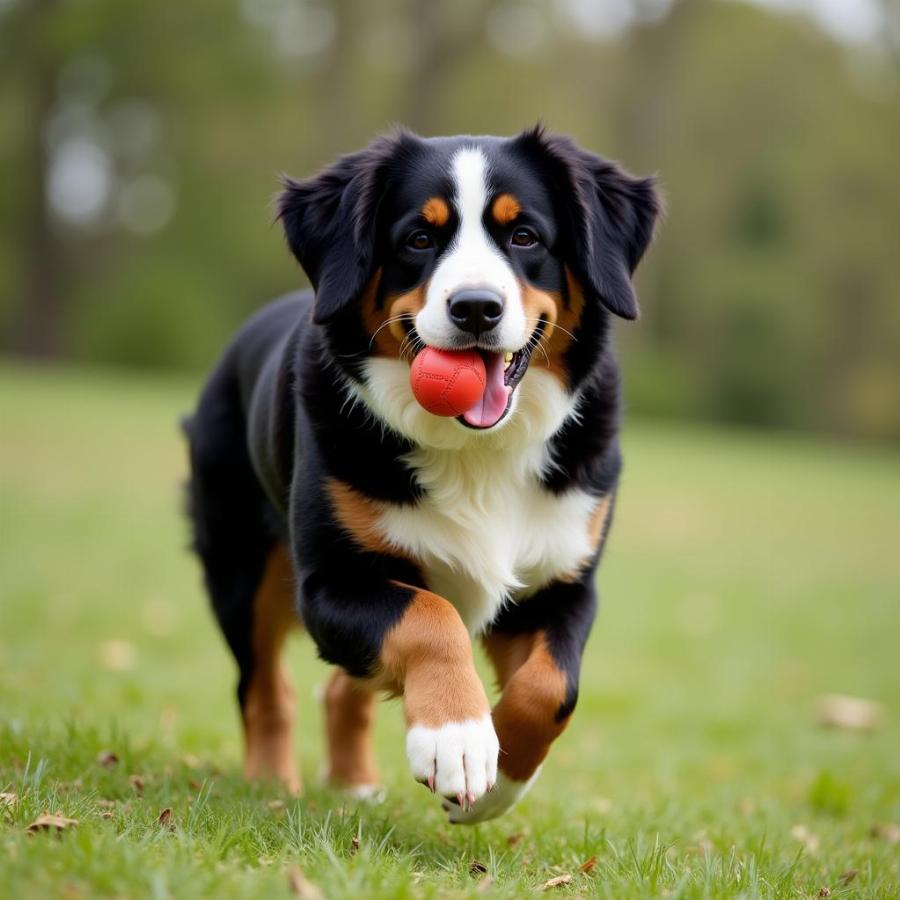Choosing the right dog breed can be a tough decision, especially when considering gentle giants like the Great Pyrenees and Bernese Mountain Dog. Both breeds are known for their large size, fluffy coats, and generally calm demeanors. But what are the key differences between these two majestic breeds, and which one might be the right fit for your lifestyle? This article will delve into the specifics of each breed, comparing their temperaments, care requirements, and potential health concerns to help you make an informed decision.
Temperament: Gentle Giants with Distinct Personalities
While both breeds are known for their gentle nature, subtle differences in their temperaments can significantly impact their compatibility with various lifestyles. Great Pyrenees are independent and protective, originally bred to guard livestock. This independent streak can sometimes translate to stubbornness during training. They are devoted to their families but can be reserved with strangers. Bernese Mountain Dogs, on the other hand, are generally more sociable and eager to please, making them relatively easier to train. They thrive on human companionship and are often described as gentle giants with a playful side. So, if you’re looking for a dog that’s constantly by your side and enjoys being the center of attention, a Bernese might be a better fit. However, if you prefer a more independent dog that’s naturally protective, a Great Pyrenees might be more suitable.
Grooming: Keeping Those Fluffy Coats in Top Condition
Both Great Pyrenees and Bernese Mountain Dogs sport thick, double coats that require regular grooming to prevent matting and excessive shedding. The Great Pyrenees typically have a white coat, while Bernese Mountain Dogs have a tri-color coat of black, white, and rust. While both require regular brushing, the Bernese Mountain Dog’s longer coat might demand more frequent and intensive grooming sessions, especially during shedding season. Are you prepared to dedicate the time and effort required to keep these fluffy coats looking their best?
Exercise Needs: Big Dogs, Big Energy Requirements
Don’t let their calm demeanor fool you; both breeds require regular exercise to stay healthy and happy. While they don’t need intense workouts, daily walks and playtime are essential. Great Pyrenees, given their guarding instincts, benefit from having a large, securely fenced yard to patrol. Bernese Mountain Dogs, while also enjoying outdoor activities, are generally content with moderate exercise. What kind of space do you have available for your dog to roam and play?
 Bernese Mountain Dog Playing Fetch
Bernese Mountain Dog Playing Fetch
Health Considerations: Potential Breed-Specific Issues
Like all breeds, both the Great Pyrenees and Bernese Mountain Dog are prone to certain health issues. Great Pyrenees can be susceptible to bloat, hip dysplasia, and bone cancer. Bernese Mountain Dogs are also prone to hip and elbow dysplasia, and sadly, have a shorter lifespan than many other large breeds, often due to cancer. It’s crucial to choose a reputable breeder who screens their dogs for these health problems. Are you prepared for the potential veterinary costs associated with these larger breeds?
Training: Patience and Consistency are Key
Both breeds can be trained, but their different temperaments require slightly different approaches. Great Pyrenees, with their independent nature, can be more challenging to train and require patience and consistency. Positive reinforcement methods generally work best. Bernese Mountain Dogs, being eager to please, are typically more receptive to training and enjoy learning new things. What is your experience level with dog training, and are you prepared for the potential challenges?
Which Breed is Right for You?
Choosing between a Great Pyrenees and a Bernese Mountain Dog ultimately depends on your individual lifestyle and preferences. Do you have a large, fenced yard? Are you looking for a protective dog or a more sociable companion? Are you prepared for the grooming and potential health concerns associated with each breed? Consider these factors carefully to make the best decision for you and your future furry friend.
FAQ: Common Questions about Great Pyrenees and Bernese Mountain Dogs
- Are Great Pyrenees good with children? Generally, yes, but early socialization is key. Their protective instincts can be beneficial, but they may also be wary of strangers.
- Are Bernese Mountain Dogs good apartment dogs? While not ideal, it’s possible with adequate exercise and attention. However, they thrive in homes with yards.
- Do Great Pyrenees bark a lot? They can be vocal, especially when guarding.
- How much do Bernese Mountain Dogs shed? They shed significantly, especially during shedding season.
- Are Great Pyrenees easy to train? They can be stubborn, requiring patience and consistent training.
- How long do Bernese Mountain Dogs live? Unfortunately, their lifespan is shorter than many large breeds, averaging 6-8 years.
- Are Great Pyrenees good with other dogs? With proper socialization, they can coexist peacefully with other dogs.
Related Content You Might Find Interesting
Beaut Dogs is your trusted resource for all things related to dog breeds, offering comprehensive information and expert advice. We cover various aspects of dog ownership, including breed characteristics, care guides, and helpful tips for a happy and healthy companionship. For any specific questions or concerns, please contact us via Email at [email protected] for detailed and accurate assistance. Beaut Dogs is committed to providing you with the best resources for your furry friends.